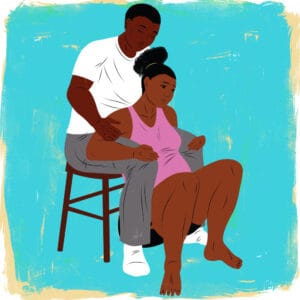A Father and Partner’s Guide to Support Through Pregnancy and Beyond
Mark Williams
Fathers Reaching Out: Fatherhood and Mental Health
https://www.reachingoutpmh.co.uk/
Author, keynote speaker and campaigner
Instagram @fathers_mentalhealth
Summary
Becoming a parent can be challenging for you and your partner. It’s very important that conversations happen between yourself and your partner. Mothers would rather know that you feel anxious and open about your mental health. For any concerns, you may have, make sure to go to a health professional who understands perinatal mental health. This article should help direct you to some things to start thinking about or discussing with your partner prior to birth!
Father and Partner’s Guide
- It’s very important that conversations happen between yourself and your partner. Mothers would rather know that you feel anxious and open about your mental health. Any concerns you may have, make sure to a health professional who understands perinatal mental health.
- Leading up to the birth, it’s also too important to ask all the grandparents and family what their expectations are and that you have this and maybe about smoking around the baby and how you have learned the best for your child, which updated education may not have been offered to them.
- For any concerns, now are the time to seek help if you’re struggling with your mental health. As when the baby comes along, there may be less sleep, and now you have to look after a baby as well. Fathers who are depressed are less likely to read, dance and play and also follow good practice guides like putting the baby safely on the bed or doing other important things.
- Many fathers find that going along to the scans helps them get their heads around the fact that a baby is on its way. Seeing the baby on the ultrasound screen can make them feel it is real. Later in the pregnancy, you’ll both want to attend antenatal classes, usually organised by the local midwives or your GP. Such courses should be offered to you and your partner as part of the standard package of NHS support. Some online resources are bitesize and can be free to go through with yourself and your partner. Fathers and partners now have the right to take unpaid time off work to accompany expectant mothers to up to two antenatal appointments,
- When your baby comes along, you and your partner may feel as if you’re in limbo in the weeks and days leading up to the birth. She may be fed up with being pregnant but worrying about labour. You’re probably not looking forward to seeing your partner in pain and are wondering how you can help. And chances are you’re both looking forward to meeting your baby but also feeling a little anxious about the expectations as parents.
- During labour, it’s very important to process if things do not plan and talk to someone. Many fathers and birth supports have suffered from post-traumatic stress disorder, which is an anxiety disorder either witnessing or experiencing a life-threatening event. You must feel part of the process and ask your midwives anything you may not understand.
- Sometimes fathers may not always have those strong feelings of love straight away, but it will come as some skin-to-skin bonding with your baby. Cuddling your little one against your bare skin releases the hormone oxytocin, also known as the love hormone. Your little one will enjoy bonding with you, and it will help increase your confidence as a new parent.
Postnatal Depression
New dads and partners can also suffer from postnatal depression following the birth of a baby, and a lack of confidence is sometimes the first to happen. This is more likely to happen if your partner is experiencing depression, you have had previous depression, or you are a first-time dad. You are more likely to recover quickly if you acknowledge the problem. Consider asking for support or practical help from family or friends or consulting your GP. Remember, as a new dad, it is important that you look after your own physical and emotional well-being so that you can look after your family as well as yourself. It’s important to know that there are many fathers who struggle with their mental health during the perinatal period. With the latest research, as high as 22% and 50% of fathers may experience anxiety and depression after supporting their loved ones – So it’s important you know that you are not alone and it’s ok not to be ok3 It’s also important that families who are health professionals are aware to ask fathers “How are you doing” as many feel isolated and lonely during this period. There are also changes in hormones, including testosterone, estrogen, cortisol, vasopressin, and prolactin, during the postnatal period in fathers may be biological risk factors in paternal postnatal depression.
Symptoms can happen during the antenatal period and are most commonly seen in the first few weeks after birth; they can occur anytime within the first year and beyond. Emotional, behavioural and cognitive changes may be caused. Some of the symptoms are –
- The feeling of sadness and anxiety
- Sleeping a lot or too less
- Eating too less or too much
- Unexplained aches, pain or illness
- Anxiety, irritation or anger for no reason
- Sudden mood changes
- Poor concentration
- Difficulty in remembering things
- Feelings of worthlessness, guilt and hopelessness
- Recurrent thoughts of death and suicide
- Lack of pleasure in things that were earlier enjoyable
- Feeling disconnected from the baby2
This is not your fault, but you need to take some responsibility for getting yourself well again. Here are some things that you can and should do immediately.
- Believe that you will get better and recognise that you are unwell and not a failure.
- Take every opportunity to get plenty of rest/sleep.
- Accept any offers of help graciously.
- Get enough nourishment. Have a daily treat.
- Get some exercise, e.g. a walk around the park with the pram.
- Find time to talk and have some fun with your partner.
- Make sure you don’t give up your hobbies – Maybe less time doing them
Remember, you don’t have to:
- Try and be superhuman … if something doesn’t get done, there is always tomorrow.
- Blame yourself or your partner.
- Make any major decisions, e.g. moving house or job.
It’s very important that if you’re struggling, the quicker the help, the quicker the recovery. Many relationships have suffered due to the silence and the common masking of emotions which may change your personality. This can make dads feel they need to drink more or avoid situations with feelings of anger during the antenatal and postnatal period.
References:
- Kim, P., & Swain, J. E. (2007). Sad dads: paternal postpartum depression. Psychiatry (Edgmont (Pa. : Township)), 4(2), 35–47.
- National Health Service (2022) Symptoms- Postnatal Depression. Available at: https://www.nhs.uk/mental-health/conditions/post-natal-depression/symptoms/Kim, P., & Swain, J. E. (2007). Sad dads: paternal postpartum depression. Psychiatry (Edgmont (Pa. : Township)), 4(2), 35–47.Kim, P., & Swain, J. E. (2007). Sad dads: paternal postpartum depression. Psychiatry (Edgmont (Pa. : Township)), 4(2), 35–47.\Hanley,
- J. and Williams, M., 2019. Fathers and perinatal mental health. 1st ed. London: Routledge.
Links to resources
 Books
Books
 Websites
Websites
How are you Dad? On Apple Podcasts
The Importance of New Fathers Mental Health| Mark Williams| TEDx
















